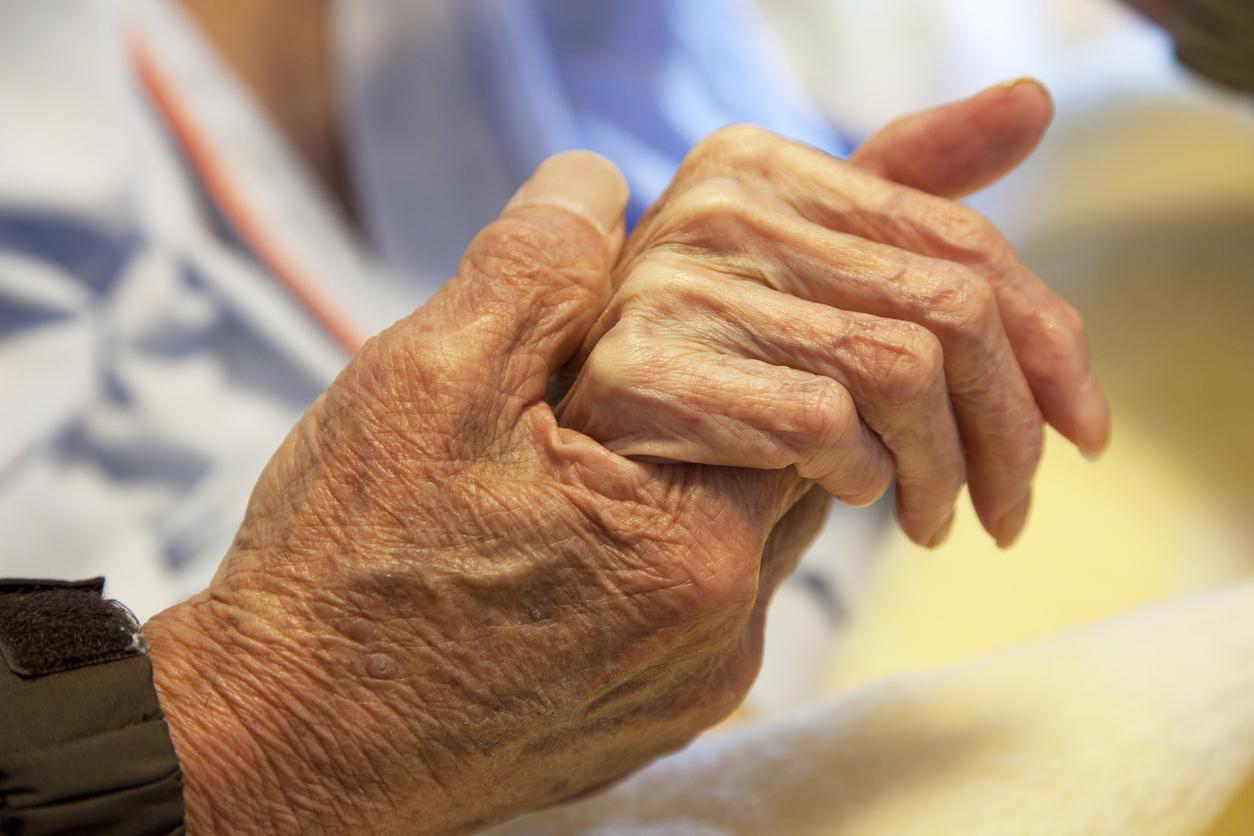‘No, I don’t mind’
Why do some people systematically bury their heads in the sand? And how do you react to that as a partner or family member?
The asthma nurse called to make an appointment with her husband for a check-up. “I didn’t think that was a good idea,” says Hetty Mansveld (45, not her real name). “I am not his mother! I did discuss it with Koos later, but I shouldn’t go too far into that, because then he will get irritated. And I get that. It is his body.”
Koos (48, not even his real name) is not seriously ill: according to Hetty he has asthma, according to himself ‘asthmatic complaints’. He went to the doctor once. It turned out that a special asthma nurse was attached to the practice. She measured his lung capacity and gave him medication, so-called ‘puffs’ that widen the airways. Koos: “They would gradually reduce the complaints. I used them, but when the stock ran out, I didn’t get a new one. That was a few years ago now. I have the complaints under control, I’m doing fine. Then why should I make myself a patient and see a doctor every few months?”
Making your own decisions is a right
People who are sick, but do not go to the doctor: it is not a rarity. There are no figures, but if you ask around in your area, you often come across people who postpone a doctor’s visit for years or never even go to a hospital or GP practice. It can be complaints such as asthma or back pain, but also life-threatening diseases such as diabetes, heart problems or even cancer.
So what can you do as a partner? Applying pressure to move the patient and yet to see a doctor does not always help. And it is even questionable whether that is always an appropriate response. Officially speaking, the patient has autonomy, in other words the right to make decisions about his own body and health. Maartje Schermer, associate professor of Medical Ethics at the Erasmus Medical Center in Rotterdam: “If someone doesn’t want to go to the doctor, there’s not much you can do except encourage or pressure someone. With one important condition: the patient must be mature and sane to be able to make choices for himself.”
That many patients can do just that is good news for those concerned about a sick person who does not see a doctor. After all, it provides plenty of space for a conversation about the illness, about the choices that the sick person makes, about his considerations, concerns, fears and wishes. Maartje Schermer: “Understanding someone’s choice makes it easier to accept it, even if the choice is not to consult a doctor.” She immediately puts this into perspective, saying that understanding often becomes more difficult the more serious a person is. “If someone is really sick, it can be very difficult to understand why he does not want medical help. But even then, you cannot do much more than talk and try to be understanding.”
Incidentally, this understanding often works in both directions: “Through a conversation, the sick person also gains a greater understanding of the concerns of his environment. That can bring them closer together and even create a compromise: he may want to accept certain medical care if it takes away some of the worries of his environment.”
Deniers feel better
Psychiatrist Tineke Vos, who works at the Bronovo Hospital in The Hague, recently obtained her doctorate from the University of Amsterdam on research into ‘denial and quality of life of lung cancer patients’. With a reassuring outcome: patients who (more or less) deny their illness were less tired, less short of breath, less nauseous, less anxious and less depressed. According to Vos, it is important to understand why a sick person chooses not to see a doctor. Often such a choice stems from fear. Vos: “That can be fear of a diagnosis or treatment, but also the fear of having to go through life as a ‘patient’ from now on. Not such a strange fear of course: pills and doctors can do a lot, but there are always side effects, and who goes to the hospital for fun?”
That also plays a role with Koos Mansveld, although ‘fear’ is a big word. He describes it this way: “Suppose I go to that special asthma nurse and my lung capacity turns out to be smaller than last time. Do I want to know? I function just fine, so I don’t really see the point of all that information. Yes, I may feel even better if I get treated, that I don’t realize now that the asthma is hindering me, but I don’t think it is. I have my own company where I put a lot of energy into, I play volleyball and walk a lot, I never experience an energy shortage.”
Except when he wanted to go for a run: that didn’t work. And also animals and dust activate his shortness of breath. “I know that, so I take that into account. If I want to run in the future, I will first see a doctor.” His wife Hetty maintains that it is better to seek medical help now: “I just don’t get it. It’s about his health, isn’t that important? And he doesn’t notice it himself, but at night he breathes very heavily, and he didn’t have that when he took those puffs. So those drugs really do help.” Koos: “Of course she is right. But I’m not going anyway. Procrastination has become cancellation.”
Pressurize
In addition to fear, denial of the disease can also be a reason not to see a doctor, or, as with Koos Mansveld, self-management that works according to the patient. To what extent can you put pressure on a patient to see a doctor? Physician and philosopher Maartje Schermer: “The less someone is able to make a rational decision, the more pressure is justified.”
In practice, it is mainly psychiatric patients and people with dementia who are treated against their will: because of their condition they are no longer able to make well-considered decisions. “They often cannot reason well why they don’t want to see a doctor,” says Maartje Schermer. “An elderly person with dementia who only says: ‘I don’t want to’, what exactly does he mean? Does he not want to go to the doctor, does he not want to go to a hospital or institution, does he not want medicine, or is it something very simple, such as not wanting to put on shoes or coat to leave? Such a person cannot think or reason about what he does and does not want and why, and therefore cannot make a well-considered choice.”
Whoops, in the car…
Does someone seem paralyzed by fear due to alarming symptoms such as coughing blood, blood in the stool or a lump in the breast and refusing to visit a doctor, even after a conversation, even after insisting? Then it can also be pleasant for the patient if someone in the environment takes over responsibility and puts the patient in the car and drives to the doctor. But that doesn’t always work. Moreover, going to the doctor is not enough. Tineke Vos: “Then you have to talk to the doctor and you can’t treat someone against his will either.”
And in fact, that’s not what the environment of a ‘reluctant’ patient wants, she adds: “Just look at psychiatric patients or people with dementia, where you can be forced to be admitted. That is also very difficult for the person who has to make that decision.”
According to Tineke Vos, the goal should therefore not be how to get someone to the doctor at any cost. “I expressly make no value judgments about whether or not to go to the doctor. If the choice is deliberate and made in the right mind, both choices are worth equally. Even if the choice not to see a doctor is partly based on fear. Are there also many people who do go to the doctor out of fear, for example fear of death?”
In the meantime, Koos Mansveld is considering contacting the asthma nurse. As a result of the interview, he reconsidered his own situation. “When I go, I learn more about myself and that’s helpful, there’s little to argue with that. But I go on my own time, not because someone else encourages or pressures me. Stubborn? But it’s also my body, isn’t it?”
Have the GP intervene?
There are no rules for general practitioners for dealing with patients who do not want to see a doctor, but general practitioners also consider the patient’s autonomy to be of paramount importance. It therefore usually makes no sense to ask the doctor to intervene, because he has no means for this. But: the GP is not only a doctor for the individual patient, but also a family doctor. If a sick person does not want to go to the doctor and the family suffers as a result of this refusal, you can ask the GP to make a home visit to discuss the situation. But also keep in mind: the purpose of such a visit is not to get the sick person into the medical circuit (although that may well be the result), but to see what help is needed to get the family back in. to get balance.
Sources):
- Plus Magazine














